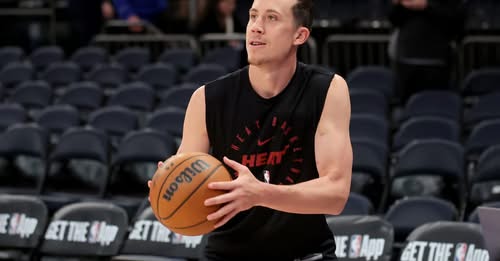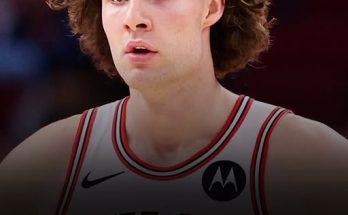“Am I good enough?” The question may sound like something whispered by an unsure high school athlete or a benchwarmer trying to make a college roster. But when it comes from the mouth of one of the NBA’s most elite shooters—Duncan Robinson—it hits differently. It echoes with vulnerability, depth, and the sobering reality that even those performing at the highest level are not exempt from self-doubt. In a league dominated by bravado and confidence, Robinson’s candor breaks the mold. And in doing so, he reminds fans and fellow athletes that the human behind the jersey often faces a different kind of battle—a mental and emotional one.
Robinson’s rise to NBA prominence is already a story that defies convention. Undrafted out of Michigan, a Division III transfer from Williams College, and largely unknown until he emerged with the Miami Heat, Robinson was never supposed to be one of the league’s most feared sharpshooters. Yet he clawed his way up, earning a spot on a Heat roster that prided itself on development and grit. Once there, he didn’t just survive—he thrived. At his peak, Robinson was one of the NBA’s most lethal perimeter threats, setting records and redefining what an undrafted player could achieve in the modern three-point era.
Still, none of the accolades, milestones, or praise could completely drown out the inner voice that questioned his worthiness. “Am I good enough?” is not simply a passing thought for Robinson—it’s a recurring internal dialogue that has shaped his journey. In a recent interview that resonated widely across both the sports and mental health communities, Robinson opened up about his struggles with anxiety and the persistent fear of not measuring up. That kind of honesty is rare in professional sports, especially in a hypermasculine space like the NBA, where vulnerability is often mistaken for weakness.
What makes Robinson’s confession so compelling is that it collides directly with the image fans have of him. To the casual observer, he’s the quintessential specialist—a sniper with a quick release, unshakable form, and a work ethic that borders on obsessive. Yet behind those corner threes and motion threes and off-the-dribble bombs lies a man constantly working to silence the part of his brain that tells him he might not belong. For many, this paradox is difficult to reconcile. How can someone so proficient at their craft still feel unsure? But for those who understand anxiety—truly understand it—Robinson’s story rings tragically true.
At its core, anxiety often doesn’t care about reality. It doesn’t consider the stat sheets, the praise from coaches, the role on a playoff-contending team. It clings to the “what-ifs,” amplifies the bad games, and distorts criticism into evidence of inadequacy. For Robinson, the stakes are even higher. The NBA isn’t just about skill—it’s about fit, confidence, perception, and timing. A few bad games can lead to a reduced role. A shooting slump can invite criticism that cuts deeper when it mirrors what you already fear. Even as he broke franchise records for threes, Robinson still found himself grappling with the imposter syndrome that had followed him since his unlikely basketball ascent.
His struggles intensified during the 2021-2022 season, a year that brought heightened scrutiny and shifting rotations. While his contract had skyrocketed—he signed a five-year, $90 million deal with Miami—the expectations that came with it weighed heavily. Shooting slumps became narratives. Narratives became doubts. And the doubts? They began to blur into his identity. The same player who once played freely, with a chip on his shoulder and nothing to lose, was now paralyzed by the fear of not living up to the price tag.
This isn’t a new phenomenon in sports. Big contracts and media attention often come with pressure. But what’s different about Robinson is how openly he’s chosen to address it. He didn’t retreat into clichés or offer vague responses about “trusting the process.” Instead, he leaned into the discomfort, publicly acknowledging the mental health battles that many players—especially role players like him—face in silence. On his own podcast, “The Long Shot,” which he co-hosts with close friend and former teammate Davis Reid, Robinson has spoken candidly about mental health, burnout, and the need for emotional support in the high-stakes world of professional basketball.
That openness has earned him admiration from both fans and mental health advocates. It’s also shed light on an often-ignored reality: not every NBA player lives in the same psychological space as a superstar. Role players, even elite specialists like Robinson, constantly operate in survival mode. They don’t have the luxury of bad weeks. They can’t coast on reputation alone. One slump can lead to fewer minutes, a DNP, or worse—a trade. This pressure-cooker environment exacerbates existing mental health challenges and reinforces a dangerous loop: the harder one tries to suppress anxiety to maintain performance, the more that anxiety festers and eventually manifests in the very thing one’s trying to avoid—poor play.
In Robinson’s case, breaking that loop meant redefining success. He began working not just on his jumper, but on his mindset. Meditation, therapy, intentional breathing, and journaling all became tools in his arsenal. He started shifting his self-worth away from the box score and toward the daily work—the preparation, the attitude, the discipline. This shift didn’t eliminate the anxiety, but it helped him live with it, rather than be consumed by it.
And then came the 2023-2024 season—a quiet resurrection. While the numbers didn’t scream “All-Star,” Robinson rediscovered a version of himself that played with joy and purpose. He contributed meaningfully in playoff runs, spacing the floor and making defenses scramble. His confidence returned—not because the anxiety had disappeared, but because he stopped letting it dictate every thought and decision. The internal question, “Am I good enough?” still lingered, but it no longer controlled the narrative.



